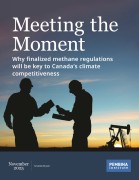The Pembina Institute, International Institute for Sustainable Development, David Suzuki Foundation, Environmental Defence, and Climate Action Network Canada have joined together to submit recommendations to the Government of Canada on the Canada Energy Regulator’s development of a net-zero scenario.
The modelling of different scenarios is key to good governance. They can be used to evaluate government spending and policies, to ensure that the decisions being made today are consistent with a world policymakers want to create in future. In terms of climate, this means developing a scenario which helps policymakers understand what changes are needed to create the conditions in which warming is limited to less than 1.5 degrees Celsius – a commitment that Canada, and many other nations, signed up to in 2015.
The Canada Energy Regulator’s net-zero scenario could also provide a basis for developing sector-specific targets, such as the federal government’s announced cap on emissions from the oil and gas sector.
We have six main recommendations for the Canada Energy Regulator, and the Government of Canada more broadly, to consider as the net-zero scenario is developed:
- Make the net-zero scenario central to the Canada Energy Regulator’s annual Energy Futures report (replacing the “reference” or “current” scenario, which assumes modest uptake of clean energy technology). Making the net-zero scenario the central scenario provides clear direction on policymakers’ objectives.
- Keep the path to net-zero within the global carbon budget, as set out by the IPCC. This matters because, while there are many paths to net-zero, there are fewer that are compatible with limiting global temperature increase to 1.5 degrees Celsius.
- Avoid over-reliance on negative emissions technologies (such as carbon dioxide removal techniques, including carbon capture technology).
- Ensure oil and gas sector emissions reductions are consistent with the Nationally Defined Contribution target of a 45% decline by 2030.
- Acknowledge the declining role of fossil fuels globally as countries transition to net-zero, and the impact of that transition on Canadian production.
- Align with emissions models and reporting undertaken by Environment and Climate Change Canada.







